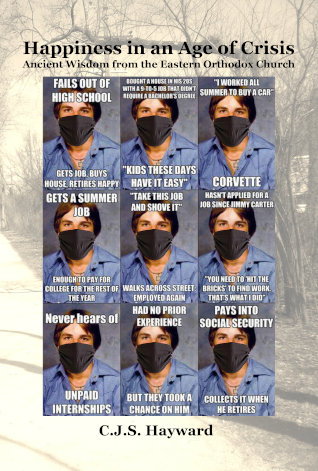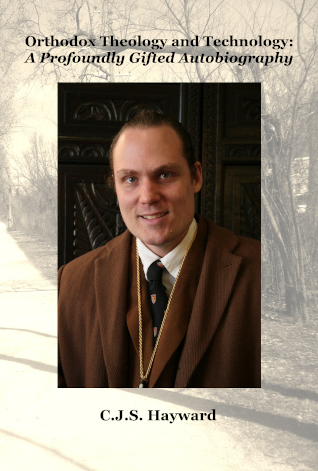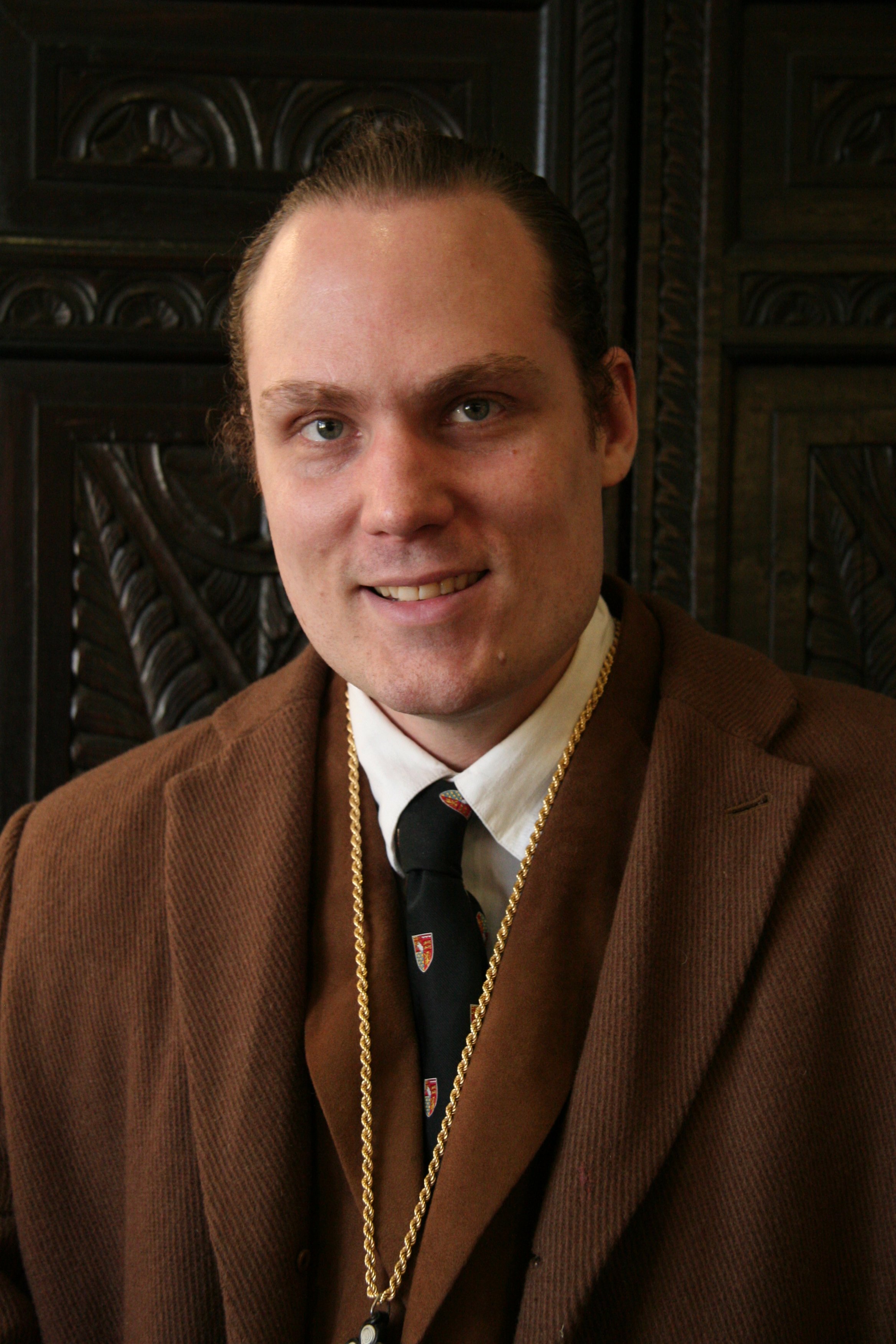I thank Thee, O my God,
For all that Thou hast done,
And all that Thou hast given me.
I thank Thee for Fr. Seraphim's militants,
Whose response to The Seraphinians: "Blessed Seraphim Rose" and His Axe-Wielding Western Converts,
Did not stop in a forum at harassment,
But show ongoing vindictiveness,
Not satisfied with one-star ratings to that title,
But see to it that positive reviews of all my works on Amazon,
If they can be dislodged,
Are taken down quickly,
Presenting readers with a review profile that gives every impression of copious mediocrity.
I thank thee for the revenge that still attacks me.
I thank Thee for Amazon's censorship,
That of the Classic Orthodox Bible,
Blessed by my heirarch out of kindness,
Though prior single-volume publications remain live,
A Bible publishing friend's advice,
To break it in multiple volumes and be easier on the books' spine,
With repetition the New Testament's Gospel and Epistles were approved at $15 each;
The whole Old Testament, Law, Historical Books, Wisdom Literature, and Prophets must elsewhere be sought, $40 apiece.
I thank Thee for Fr. Seraphfim's axe-wielding converts,
For know I not all the Reason in Thy Providence,
Yet I note a few guesses:
That by them Thou savest me from full-blown fame too soon,
And if they hit me in my pocketbook thus,
Thou givest what money I need,
Not all of my wants.
And for such things the Sermon on the Mount bids me rejoice,
And the Sermon on the Plain positively bids me leap for joy,
So truly, rejoicing is fit,
For dishonor at the hands of men on earth,
Is one mark of honor in the life to come.
I thank Thee for this transcendently important life,
Birth and death, says St. Luke, are an inch apart,
While the ticker tape goes on forever.
After death, the blessed may rise from glory to glory:
In this life alone may we repent,
In this life alone may we choose between Heaven and Hell,
Life is the dress rehearsal,
And through eternity we will live the rôle we have chosen on earth.
The devil, God's buffoon, God's jester in fact,
Announced to all Heaven St. Job a mere mercenary,
Honoring God,
So said the slanderer, only for his wealth,
And when the devil's slander proved utterly false,
The devil, who hath not power over swine except that God permit,
Slandered the saint again, shifting his slander to Job's health,
A second time struck him,
And was a second time made a buffoon.
St. Job, the blameless worshiper of God,
A title given a scant handful of times in the entire scripture,
Stands a prince to God's right hand,
Part of the great cloud of witnesses,
Victors who have run the race, fought the good fight, kept the faith;
Crowned and cheering those of us who still run the race.
St. Job's being struck down and rising up less than an inch apart,
His glory as a blameless worshiper of God lasts forever,
And following St. John Chrysostom, I proclaim him victor,
Not from when God restored his fortunes double,
But because when stricken, he answered,
"The Lord gave, the Lord hath taken away:
As it seemed good to the Lord, so hath it come to pass;
Blessed be the Name of the Lord."
Shaking the very foundation of Hell,
A work not begun only after Christ's most blameless worshiper answered,
"Behold the slave of the Lord;
Be it unto me according to thy word."
And both blameless worshipers of God cheer me,
I who in whose suffering St. Job might see,
A faint glimmer of his own in mine,
Depression, and cancer, and so.
I thank me for providers past,
One on intake gave my dosing the benefit of the doubt,
But ere too long set their hearts on improving and regulating my dosing,
Ignoring my cries that I was incapacitated when they had gone halfway to their goal,
Genuinely saddened to see me in declining health when they reached their goal,
But not considering that their victory was costing me my life;
Under that shadow and that uncertainty I wrote,
The Consolation of Theology.
And finally, they decided that their preferred dosing,
Was not quite as important as my life.
I thank thee for providers now,
Who took me in as a refugee from a provider trying to improve my dosing,
But have decided that come spring,
They have their own new quest to improve my dosing.
I have not the right to complain,
I have not reason to complain,
And not just because Orthodox see next to nothing in terms of rights,
My life is at God's disposal:
I have never gone to sleep knowing I would ever wake,
Nor can I deny,
That this may be precisely,
How the Lord sees me off to glory.
Under this shadow,
If it really is a shadow at all,
I thank God for everything.
Glory to God for all things!
I thank God for my ranking 7th in a nationwide math contest,
For seeing me to repentance for thus defining myself,
For letting me write Profoundly Gifted Survival Guide,
A note that others may learn things I learned at dearer price.
I thank God for all things material,
For food enough even in a fast,
For bedding, for electricity, Internet access;
For clothing to spare, and Paleo food to spare;
For every flash of lightning,
Every weather called fair or foul;
For a universe which announces Thy wonder,
For Heavens that declare Thy glory:
For the phenomenon I write about in Zeitgeist and Giftedness,
My coincidences of skating ahead of the Zeitgeist,
And my hope that we may indeed be at the doors of a renaissance of Orthodoxy,
That I may witness to, living or departed.
I thank Thee for my difficulties in communicating,
With autism or without;
(For profoundly gifted traits may explain things,
Without the question of autism needed.)
I thank Thee that I have needed to struggle to communicate,
And that Thou hast been with me,
Guiding me still,
I thank Thee that Thou hast placed me,
Where Fr. Seraphim's followers have seen Creation Science as just legitimate, non-doctrinally biased "science,"
And not a massive import of Protestant belief and practice to Orthodoxy where it belongeth not,
Such things are a first domino to fall,
A second domino contrarian virtue signalling by asserting Flat Earth and the like,
Perhaps a third, to take a contrarian attitude to minor things "everybody knows" the Church asserts,
A fourth, to take a seemingly discerning exception to the deity of Christ or God's redeeming love for all sinners,
I thank Thee for when and where Thou hast placed me,
And in Thy sovereign Love.
I thank Thee for a monastery at all—
Let alone a monastery such as this,
Unworthy son and brother though I may be.
I thank Thee for the Metropolitan Abbot—
Far in excess of what rights I might construe myself;
I thank Thee for the brotherhood, both for its many kindnesses and occasional friction;
Few are wise to enter hermitage directly,
And most of us if we seek monasticism are advised to the life together,
Where even frictions are part of how the Holy Spirit works on us.
I thank Thee that I have lived in the time of Covid,
And the cyber-quarantine which makes my The Luddite's Guide to Technology all the more to the point:
I thank Thee for the many places I have landed in the right time at the right time,
I would be foolish indeed to think I earned but a sliver, if any, by my own merits.
I thank Thee that I got into the web,
Within a year or two of its foundation;
I thank Thee for my website,
For every post Thou hast given me space to write,
For every help Thou hast given me,
For awards won, whether or not they were rightly sought.
I thank Thee for the Philokalia,
And an Abbot wise enough to assign me humbler fare;
I thank Thee both for his blessings to read things he thinks would fit me now,
And his refraining from offering a blessing when I might better be served by something else:
I thank Thee that I have in him a physician,
To free me from self-will, a gate of Hell;
I thank Thee for each brother;
Perhaps even it may be said, as Ransom spoke in That Hideous Strength:
"You never chose me. I never chose you."
And if I live in times resonant with That Hideous Strength's ills,
I thank Thee for the compliment Thou hast given me,
Unworthy of it though I may ever be:
For Thou hast not placed me, as in Narnia,
Where peaceful reign followed peaceful reign,
Until there was hardly anything to be put in history books.
I thank Thee for the many good things I do not even think to thank Thee for;
To be placed in such a Creation,
And under a God the Spiritual Father,
Where everything that happens,
Is said to be a blessing from God,
Or a temptation allowed for our strengthening.
I thank thee for my Abbot,
Who like any good Abbot rejoices in the creation of immortal gods:
And Thou Thyself who guidest him,
And makes his work a participation that both represents and embodies,
Thine own Work,
In the Creation of immortal gods.
I thank Thee for marriage,
And the many who find life in its blessed estate;
I thank Thee that my parents are still married to each other;
I thank Thee both for what they did wisely,
And where you have given me something to outgrow.
I thank Thee for my teachers and mine education;
For blessings and temptations for my strength;
I thank Thee that my Abbot has clarified,
That I am no longer an academic,
And has set me on a start of obediences,
To help me grow, as he seeks for each brother.
I thank Thee for the Hieromonk,
Who met me briefly on a pilgrimage elsewhere,
I hope I have not embarrassed him,
For he has done much to help me.
I thank Thee for each brother,
Child though I may be,
And their patience towards me.
I thank Thee for a 3D printer,
Both when it worked and now,
In the giving and the taking a lesson alike,
I thank Thee for what I have owned,
And what I have never owned.
I thank Thee that by Archimandrite Zacharias's writing, blessed by my Abbot,
I have been given a glimpse,
Of being a monk,
Identifying with all Adam,
Repenting, if Thou allowest,
To the benefit of all Adam.
And I thank Thee that I am a novice now,
"Bishops wish they were novices!"
And I thank Thee for Thy Holy Cross Hermitage,
And the welcome they gave me,
And the friendship that continues.
I am unworthy to thank Thee,
But I thank Thee still;
Thou art beyond all that even can be thought,
And yet Thou offerest to be our God, and my God.
If I carry a calm with me,
And am proven to be a calming presence,
I thank Thee for that,
And for seeing me through struggles that it took.
I thank you for words about arrogance in The Consolation of Theology:
A Hymn to Arrogance.
The Saint opened his Golden Mouth and sang,
'There be no war in Heaven,
Not now, at very least,
And not ere were created,
The royal race of mankind.
Put on your feet the Gospel of peace,
And pray, a-stomping down the gates of Hell.
There were war in Heaven but ever brief,
The Archangel Saint Michael,
Commander of the bodiless hosts,
Said but his name, "Michael,"
Which is, being interpreted,
"Who is like God?"
With that the rebellion were cast down from Heaven,
Sore losers one and all.
They remain to sharpen the faithful,
God useth them to train and make strength.
Shall the axe boast itself against him that heweth therewith?
Or shall the saw magnify itself against him that shaketh it?
As if the rod should shake itself against them that lift it up,
Or as if the staff should lift up itself,
As if it were no wood.
Therefore be not dismayed,
If one book of Holy Scripture state,
That the Devil incited King David to a census,
And another sayeth that God did so,
For God permitted it to happen by the Devil,
As he that heweth lifteth an axe,
And God gave to David a second opportunity,
In the holy words of Joab.
Think thou not that God and the Devil are equal,
Learnest thou enough of doctrine,
To know that God is greater than can be thought,
And hath neither equal nor opposite,
The Devil is if anything the opposite,
Of Michael, the Captain of the angels,
Though truth be told,
In the contest between Michael and the Devil,
The Devil fared him not well.
The dragon wert as a little boy,
Standing outside an Emperor's palace,
Shooting spitwads with a peashooter,
Because that wert the greatest harm,
That he saweth how to do.
The Orthodox Church knoweth well enough,
'The feeble audacity of the demons.'
Read thou well how the Devil crowned St. Job,
The Devil and the devils aren't much,
Without the divine permission,
And truth be told,
Ain't much with it either:
God alloweth temptations to strengthen;
St. Job the Much-Suffering emerged in triumph.
A novice told of an odd clatter in a courtyard,
Asked the Abbot what he should do:
"It is just the demons.
Pay it no mind," came the answer.
Every devil is on a leash,
And the devout are immune to magic.
Thou shalt tread upon the lion and adder:
The young lion and the dragon shalt thou trample under feet.
The God of peace will soon crush Satan under your feet.
Wherefore be thou not arrogant towards men,
But be ever more arrogant towards devils and the Devil himself:
"Blow, and spit on him."'
And if I, utterly unworthy to give Thee thanks, may make so bold to make a request:
May you raise me up to pen a fitting word about humility?
Thy most unworthy slave,
Br. Christos








